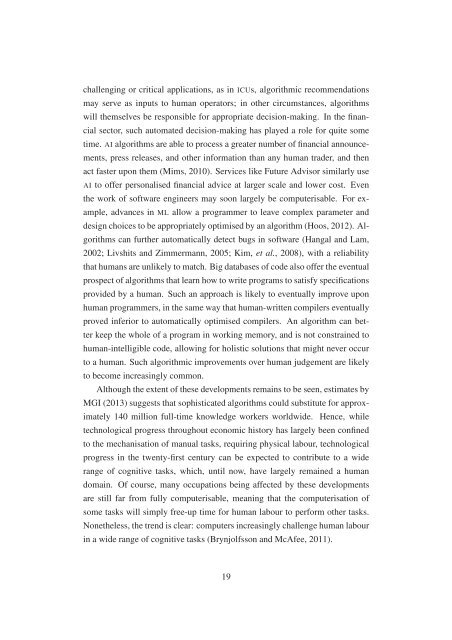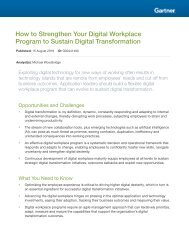The_Future_of_Employment
You also want an ePaper? Increase the reach of your titles
YUMPU automatically turns print PDFs into web optimized ePapers that Google loves.
challenging or critical applications, as in ICUs, algorithmic recommendations<br />
may serve as inputs to human operators; in other circumstances, algorithms<br />
will themselves be responsible for appropriate decision-making. In the financial<br />
sector, such automated decision-making has played a role for quite some<br />
time. AI algorithms are able to process a greater number <strong>of</strong> financial announcements,<br />
press releases, and other information than any human trader, and then<br />
act faster upon them (Mims, 2010). Services like <strong>Future</strong> Advisor similarly use<br />
AI to <strong>of</strong>fer personalised financial advice at larger scale and lower cost. Even<br />
the work <strong>of</strong> s<strong>of</strong>tware engineers may soon largely be computerisable. For example,<br />
advances in ML allow a programmer to leave complex parameter and<br />
design choices to be appropriately optimised by an algorithm (Hoos, 2012). Algorithms<br />
can further automatically detect bugs in s<strong>of</strong>tware (Hangal and Lam,<br />
2002; Livshits and Zimmermann, 2005; Kim, et al., 2008), with a reliability<br />
that humans are unlikely to match. Big databases <strong>of</strong> code also <strong>of</strong>fer the eventual<br />
prospect <strong>of</strong> algorithms that learn how to write programs to satisfy specifications<br />
provided by a human. Such an approach is likely to eventually improve upon<br />
human programmers, in the same way that human-written compilers eventually<br />
proved inferior to automatically optimised compilers. An algorithm can better<br />
keep the whole <strong>of</strong> a program in working memory, and is not constrained to<br />
human-intelligible code, allowing for holistic solutions that might never occur<br />
to a human. Such algorithmic improvements over human judgement are likely<br />
to become increasingly common.<br />
Although the extent <strong>of</strong> these developments remains to be seen, estimates by<br />
MGI (2013) suggests that sophisticated algorithms could substitute for approximately<br />
140 million full-time knowledge workers worldwide. Hence, while<br />
technological progress throughout economic history has largely been confined<br />
to the mechanisation <strong>of</strong> manual tasks, requiring physical labour, technological<br />
progress in the twenty-first century can be expected to contribute to a wide<br />
range <strong>of</strong> cognitive tasks, which, until now, have largely remained a human<br />
domain. Of course, many occupations being affected by these developments<br />
are still far from fully computerisable, meaning that the computerisation <strong>of</strong><br />
some tasks will simply free-up time for human labour to perform other tasks.<br />
Nonetheless, the trend is clear: computers increasingly challenge human labour<br />
in a wide range <strong>of</strong> cognitive tasks (Brynjolfsson and McAfee, 2011).<br />
19





